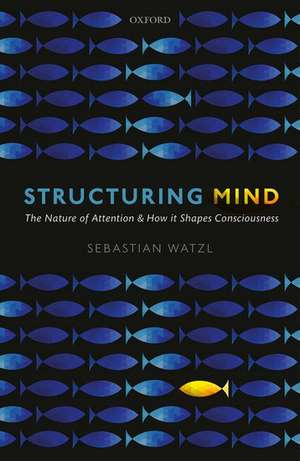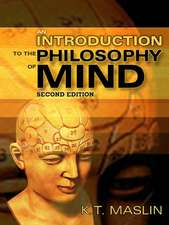Structuring Mind: The Nature of Attention and how it Shapes Consciousness
Autor Sebastian Watzlen Limba Engleză Hardback – 23 mar 2017
Preț: 500.91 lei
Preț vechi: 571.40 lei
-12% Nou
Puncte Express: 751
Preț estimativ în valută:
95.84€ • 100.08$ • 79.15£
95.84€ • 100.08$ • 79.15£
Carte tipărită la comandă
Livrare economică 04-10 aprilie
Preluare comenzi: 021 569.72.76
Specificații
ISBN-13: 9780199658428
ISBN-10: 0199658420
Pagini: 336
Dimensiuni: 160 x 241 x 27 mm
Greutate: 0.62 kg
Editura: OUP OXFORD
Colecția OUP Oxford
Locul publicării:Oxford, United Kingdom
ISBN-10: 0199658420
Pagini: 336
Dimensiuni: 160 x 241 x 27 mm
Greutate: 0.62 kg
Editura: OUP OXFORD
Colecția OUP Oxford
Locul publicării:Oxford, United Kingdom
Recenzii
What is attention? What is its role in consciousness? Watzl's book answers these questions with a simple idea: Attention structures the mind. The idea is fleshed out in this ambitious two-part work, the first providing a metaphysics of attention as an activity of ordering the mind in terms of priority, the second providing a conception of attention as organizing consciousness by centering the conscious field. Watzl has thought deeply about these issues, and the results are carefully explicated in this compelling and complex book. It provides the most comprehensive philosophical discussion of the functional and phenomenal aspects of attention currently available in monograph form.
On my reading, Watzl's book stands out from recent books in the field thanks to his engagement with broader work in philosophy. While interdisciplinary, his book is also deeply "inter-sub-disciplinary" (to use a hefty term from Ralph Wedgwood). Watzl makes informed and insightful use of work from not just cognitive science and the philosophy of mind, but also metaphysics, ontology, the philosophy of action, and the philosophy of language. Further, he engages with work outside the analytic tradition in Western philosophy, including Sartre, Husserl, and the Husserlian Gurwitsch... Watzl's unifying and systematic approach stands out for its ambition.
This book is a welcome contribution to a better understanding of the matter; not only because of the specific data and insights it gathers, but even more for the common assumptions it questions from the available literature. ... Watzl provides a rigorous philosophical analysis that professionals from various disciplines may find useful as well. ... the topic itself, the information available and the approach to the problem will be appreciated by researchers, clinicians and people from a general philosophical background.
On my reading, Watzl's book stands out from recent books in the field thanks to his engagement with broader work in philosophy. While interdisciplinary, his book is also deeply "inter-sub-disciplinary" (to use a hefty term from Ralph Wedgwood). Watzl makes informed and insightful use of work from not just cognitive science and the philosophy of mind, but also metaphysics, ontology, the philosophy of action, and the philosophy of language. Further, he engages with work outside the analytic tradition in Western philosophy, including Sartre, Husserl, and the Husserlian Gurwitsch... Watzl's unifying and systematic approach stands out for its ambition.
This book is a welcome contribution to a better understanding of the matter; not only because of the specific data and insights it gathers, but even more for the common assumptions it questions from the available literature. ... Watzl provides a rigorous philosophical analysis that professionals from various disciplines may find useful as well. ... the topic itself, the information available and the approach to the problem will be appreciated by researchers, clinicians and people from a general philosophical background.
Notă biografică
Sebastian Watzl is Associate Professor of Philosophy at the University of Oslo. He has received his PhD in philosophy from Columbia University, after studying biology at Humboldt University Berlin, and philosophy at New York University. He has been a postdoc Harvard's Mind-Brain-Behavior Interfaculty Initiative, and is a member of the core group of Oslo's Centre for the Study of Mind in Nature.



















